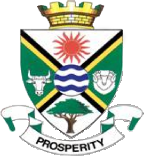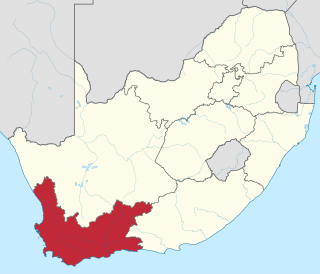Related Research Articles

The Democratic Alliance is a South African political party and the official opposition to the ruling African National Congress (ANC). The current leader of the party is John Steenhuisen, who was announced as the new leader on 1 November 2020 after the party's Federal Congress. He had previously acted as the interim leader of the party from November 2019 to November 2020 when the then party leader Mmusi Maimane resigned. Helen Zille is chairperson of both the Federal Council and the Federal Executive, the highest decision-making structures of the party. The party is broadly centrist, and has been attributed both centre-left and centre-right policies. It is a member of Liberal International and the Africa Liberal Network. The DA traces its roots to the founding of the anti-apartheid Progressive Party in 1959, with many mergers and name changes between that time and the present.

The African Christian Democratic Party is a South African political party founded in 1993. It aspires to bring "stability, prosperity and hope" to the nation and values "unity with diversity, offering leadership of trust and integrity with a passionate commitment to address the needs of all the people of South Africa." The leader of the party is Kenneth Meshoe.

The Freedom Front Plus is a national South African political party that was formed in 1994. It is led by Pieter Groenewald. Its current stated policy positions include amending affirmative action and land reform to protect the rights and interests of minorities, especially the Afrikaners.

Elections in South Africa are held for the National Assembly, provincial legislatures and municipal councils. Elections follow a five-year cycle, with national and provincial elections held simultaneously and municipal elections held two years later. The electoral system is based on party-list proportional representation, which means that parties are represented in proportion to their electoral support. For municipal councils there is a mixed-member system in which wards elect individual councillors alongside those named from party lists.

Buffalo City is a metropolitan municipality situated on the east coast of Eastern Cape Province, South Africa. It includes the towns of East London, Bhisho and King William's Town, as well as the large townships of Mdantsane and Zwelitsha.

The City of Cape Town is the metropolitan municipality which governs the city of Cape Town, South Africa and its suburbs and exurbs. As of the 2011 census, it had a population of 3,740,026.

General elections were held in South Africa on 22 April 2009 to elect members of the National Assembly and provincial legislatures. These were the fourth general elections held since the end of the apartheid era.

The Kou-Kamma Municipality is a local municipality in South Africa. It is situated in the southwest corner of the Sarah Baartman District Municipality along the Indian Ocean coastline, in the southwestern sector of South Africa's Eastern Cape Province. To the west lies the Western Cape Province. Kou-Kamma also borders the Dr Beyers Naudé Local Municipality in the north and the Kouga Local Municipality to the east. The geographical area of the Municipality is 12,540 square kilometres. Its name is a blend of the names of the Kouga (Kou-) and Tsitsikamma (-Kamma) mountains, which in turn were named after the rivers Kouga and Tsitsikamma.

The Cape Independence Party (CAPE), previously called the Cape Party, is a political party in South Africa which seeks to use all constitutional and legal means to bring about Cape Independence, which includes the entire Western Cape, Northern Cape, six municipalities in the Eastern Cape, and one municipality in the Free State. The area includes all municipalities in those provinces with an Afrikaans-speaking majority. In 2009, it had a membership of approximately 1,000 people across South Africa which has grown to over 10,000 by 2017.

The National Party South Africa (NP) is a registered South African political party, who competed for the Western Cape province in the 2009 provincial election and municipal council seats in the 2011 local government elections.

David John Maynier is a South African politician who has been the Western Cape Provincial Minister of Finance and Economic Opportunities and a Member of the Western Cape Provincial Parliament since May 2019. Maynier was a Member of Parliament from 2009 to 2019, where he was Shadow Minister of Finance from 2015 to 2019 and the Shadow Minister of Defence and Military Veterans from 2009 to 2015.
In South Africa, a provincial legislature is the legislative branch of the government of a province. The provincial legislatures are unicameral and vary in size from 30 to 80 members, depending on the population of the province. Each legislature is chaired by a Speaker and a Deputy Speaker.

Joe Morolong Local Municipality is an administrative area in the John Taolo Gaetsewe District of the Northern Cape in South Africa.

Elundini Local Municipality is an administrative area in the Joe Gqabi District Municipality of the Eastern Cape in South Africa.

Ga-Segonyana Local Municipality is an administrative area in the John Taolo Gaetsewe District of the Northern Cape in South Africa.

Lukhanji Local Municipality was an administrative area in the Chris Hani District of the Eastern Cape in South Africa. Lukhanji is a Xhosa name for the mountain that runs from the eastern side of Queenstown to the western side. After municipal elections on 3 August 2016 it was merged into the larger Enoch Mgijima Local Municipality.

The 2019 South African general election was held on 8 May 2019 to elect a new President, National Assembly and provincial legislatures in each province. These were the sixth elections held since the end of apartheid in 1994 and determined who would become the next President of South Africa.
The council of the City of Cape Town in the Western Cape, South Africa is elected every five years by a system of mixed-member proportional representation. Half of the councillors are elected by first-past-the-post voting from individual wards, while the other half are appointed from party lists so that the total number of party representatives is proportional to the number of votes received. By-elections are held to replace the councillors elected by wards if a vacancy occurs.

Western Cape is one of the nine multi-member constituencies of the National Assembly of South Africa, the lower house of the Parliament of South Africa, the national legislature of South Africa. The constituency was established in 1994 when the National Assembly was established by the Interim Constitution following the end of Apartheid. It is conterminous with the province of Western Cape. The constituency currently elects 23 of the 400 members of the National Assembly using the closed party-list proportional representation electoral system. At the 2019 general election it had 3,128,567 registered electors.

Cape independence is the political movement to make the Western Cape province - and often other regions of the Eastern and Northern Cape provinces - an independent state from the rest of South Africa.
References
- ↑ "Final Candidates List: Universal Party" (PDF). Independent Electoral Commission. Retrieved 2009-04-26.[ dead link ]
- ↑ "Results Report: Provincial Election: Western Cape" (PDF). Independent Electoral Commission. Retrieved 2009-04-26.[ dead link ]
- ↑ "Party contact information - Electoral Commission of South Africa".